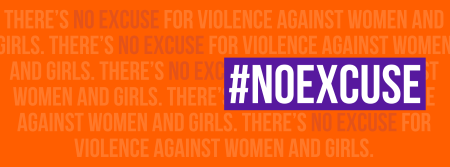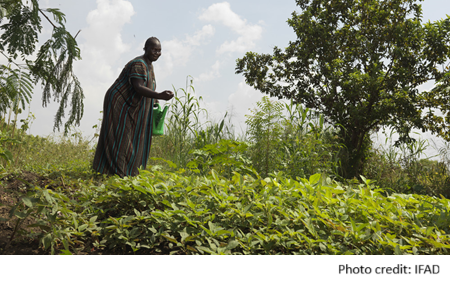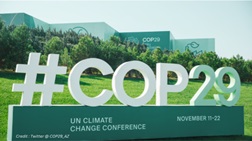As Earth Day approaches, we want to celebrate hopeful stories such as the restoration of landscapes that have been degraded, and the many benefits this can provide for people, nature, and the climate.
Here is one such story from World Resources Institute:
Sadik Ibn Abdulai watched as overgrazing and unsustainable agricultural methods turned his family’s farmland in northern Ghana from lush fields to desert. He turned tragedy into triumph by starting Tilaa Ltd., a small business that helps women small-scale farmers grow resilient cashew trees and cultivate beehives beneath their shady canopies. The trees revitalize depleted soil, cool the air, and hold moisture in the ground, while the nut and honey harvests provide the farmers with steady incomes.
Sadik’s story isn’t just a heartwarming tale about improving his little corner of the world. Small, locally-led projects like Sadik’s are exactly what is needed to overcome Africa’s triple crises of climate change, ecosystem degradation, and poverty. Read more here.
"Today we face a series of interlocking crises which have a direct impact on women’s lives, from conflict and the threat of nuclear weapons to climate change, pandemics and systematic inequality. ... What we need now is for women to have a direct impact on these crises, bringing a new wave of feminist solidarity and justice to create a better world for future generations. We need to reimagine what global leadership looks like so that women have the support and opportunity to be powerful agents for change." -- Mary Robinson
Mary Robinson, first woman President of Ireland and former UN High Commissioner for Human Rights, now Chair of The Elders, recently gave a keynote address to the Women’s Empowerment Assembly in Tokyo on the importance of women's leadership in creating a peaceful, sustainable and equitable future. She calls on world leaders to confront prejudice and discrimination, and to hear and respect women's voices. You can read her keynote address here.
For GRAN and more than 90 other civil society organizations focused on human rights, international development and humanitarian assistance, the Federal Budget on March 28th was a big disappointment. In spite of the urgent needs around the world, particularly as we face a global hunger crisis, and in spite of their promise to increase international assistance spending year over year, the Canadian government actually reduced its investment in international aid as compared to last year's Budget. Read this news release issued by the Bigger than our Borders coalition in response.
World TB Day is observed annually on March 24 to raise awareness about TB and efforts to end the global epidemic, marking the day in 1882 when the bacterium causing TB was discovered.
TB is an ancient disease that is still with us. It is preventable and curable, and yet, worldwide, TB remains one of the world’s deadliest infectious killers. Ending the TB epidemic in all countries by 2030 is one of the targets of UN Sustainable Development Goal #3: Good Health and Well-Being.
While TB is rare in most of Canada, that is not true in Canada’s north, where in recent years TB rates in Inuit communities have been as much as 300 times higher than those of non-Indigenous people born in Canada.
On this World TB Day, learn more about this disease and efforts to end it. Click here to learn more about TB in Canada’s north. And here to find out more about global efforts to end TB.
International Women's Day -- March 8 -- is a global day celebrating the social, economic, cultural, and political achievements of women. The day also marks a call to action for accelerating women's equality.
This International Women’s Day, GRAN celebrates women who are changing the future of farming in Africa.
Click here to meet seven young women who are strengthening food security in their communities through sustainable agriculture initiatives.
In a groundbreaking declaration made on February 6, 2023, International Day of Zero Tolerance for Female Genital Mutilation, Chief Zanzan Karwor, Chairperson of the National Council of Chiefs and Elders in Liberia, declared, “By the power vested in me by all the Paramount Chiefs of the 15 political divisions in Liberia and signed by myself… FGM is banned in Liberia.” Read more here.
Canada is investing in immediate and sustainable programs to ensure access to quality education for children and youth in emergency and crisis situations so that no child is left behind. Canada has announced a pledge of $87.5 million over 4 years (2023 to 2026) to Education Cannot Wait (ECW), the United Nations global fund for education in emergencies and protracted crises. Click here to read more.
Good news! In a unanimous declaration, African leaders pledge to end AIDS in children by 2030. Ministers and representatives from twelve African countries have committed themselves and laid out plans to end AIDS in children by 2030. International partners have set out how they will support countries in delivering on those plans, which were issued at the first ministerial meeting of the Global Alliance to end AIDS in children. For more on this announcement, click here.
The New Humanitarian has just released its report on the humanitarian crises needing urgent attention in 2023. Most of them are driven by conflict and climate shocks, compounded by pre-existing vulnerabilities and inadequate access to services. Five of the identified crises are on the continent of Africa, with hunger and food insecurity a major element of all eleven ongoing crises in the Global South.
The report is sobering, but an important read. Click here to access it.
"The United Nations Committee on Economic, Social and Cultural Rights... states that the right to food is indispensable for the fulfillment of other human rights. ...Since human rights are indivisible and interdependent, a human right cannot be enjoyed fully unless other human rights are also fulfilled. Advocating policies that promote other human rights — like health, education, water and sanitation, work and social protection — can positively impact the right to food as well." -- Maximo Torero, Chief Economist of the UN Food and Agriculture Organization (FAO)
Click here to read Maximo Torero's Human Rights Day article on the right to food.
Pages


